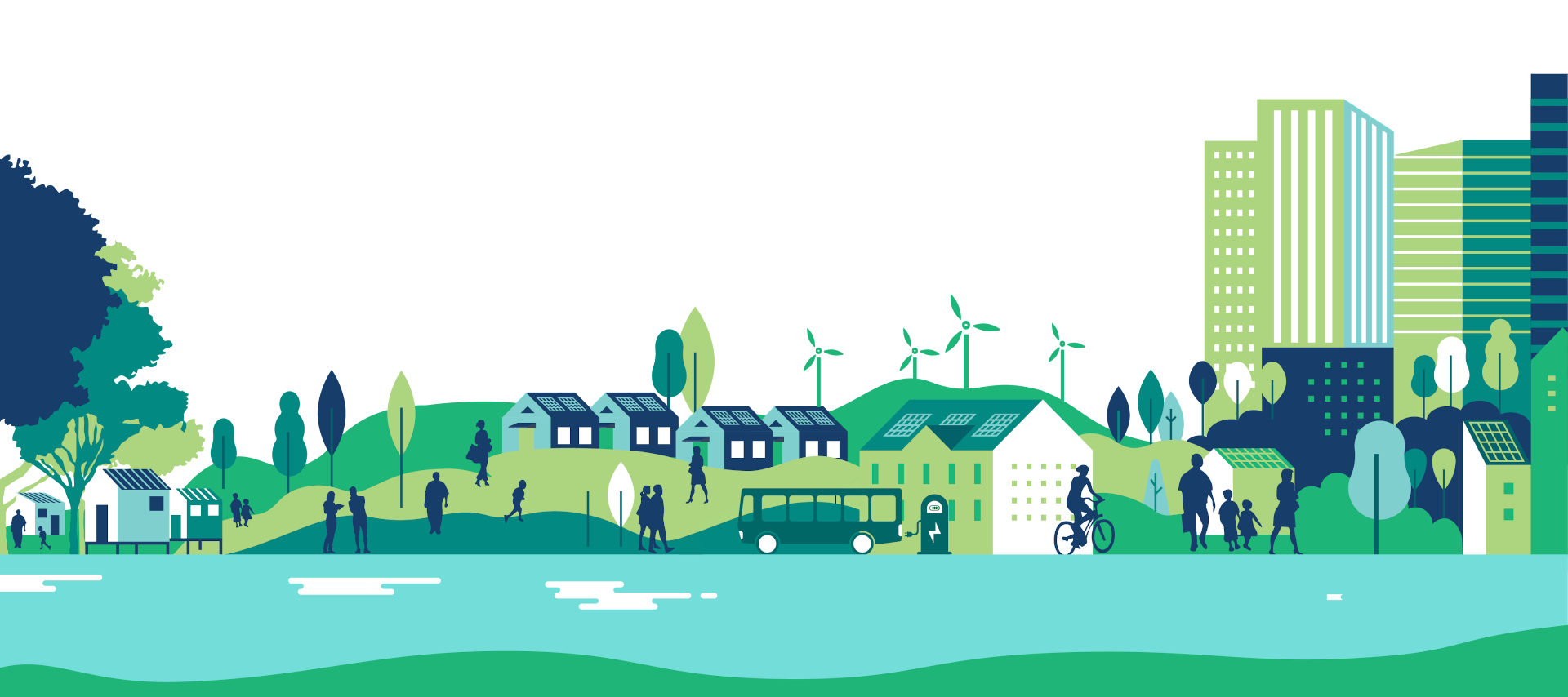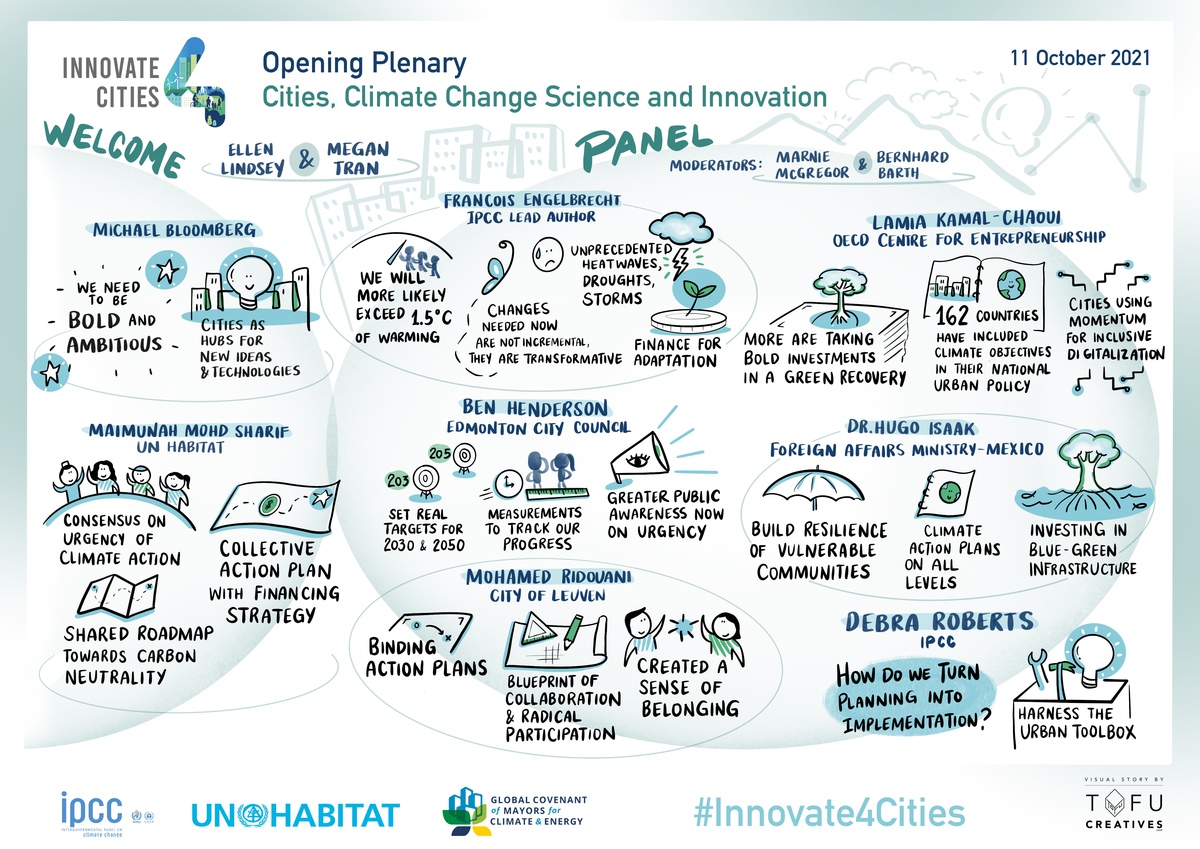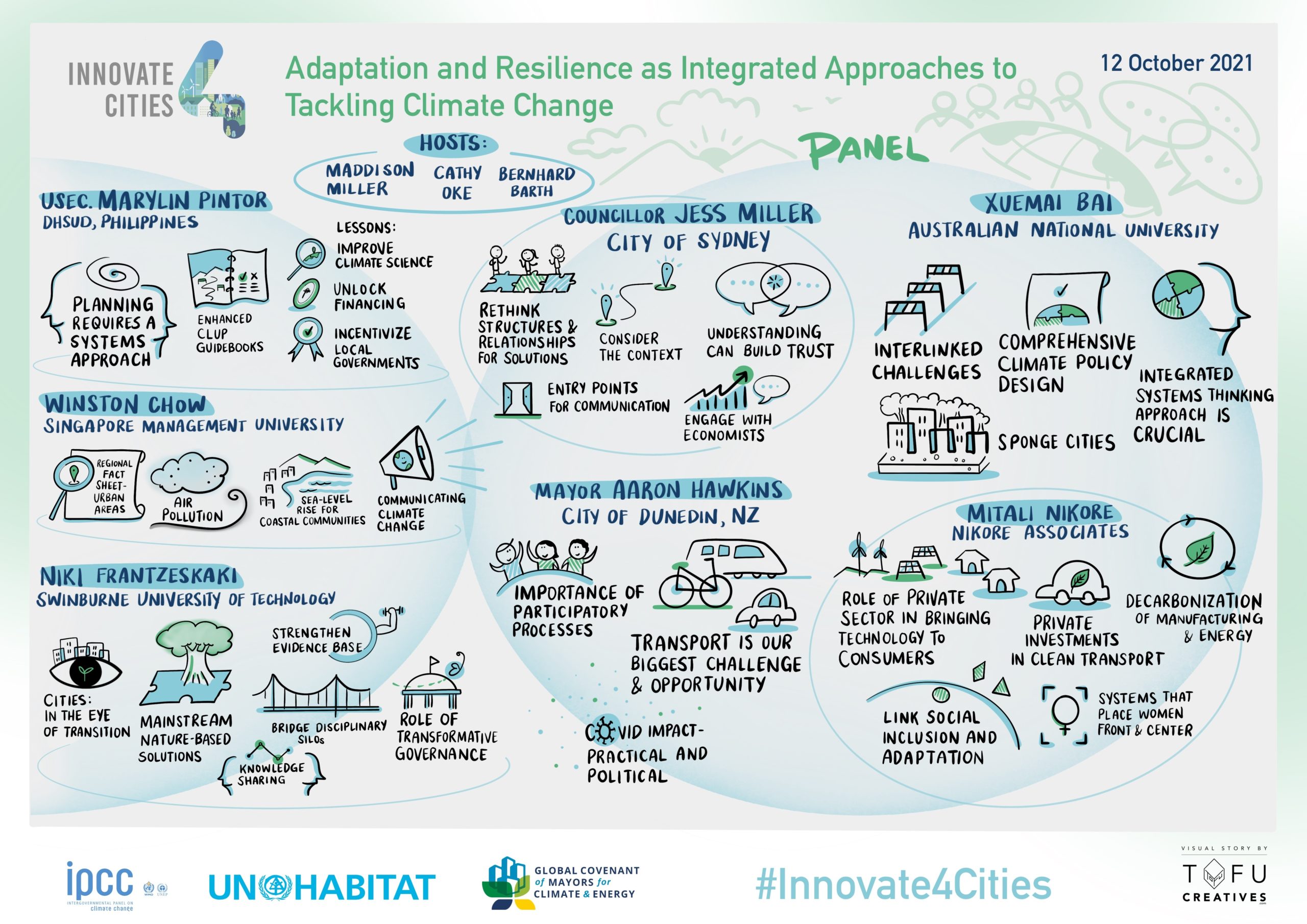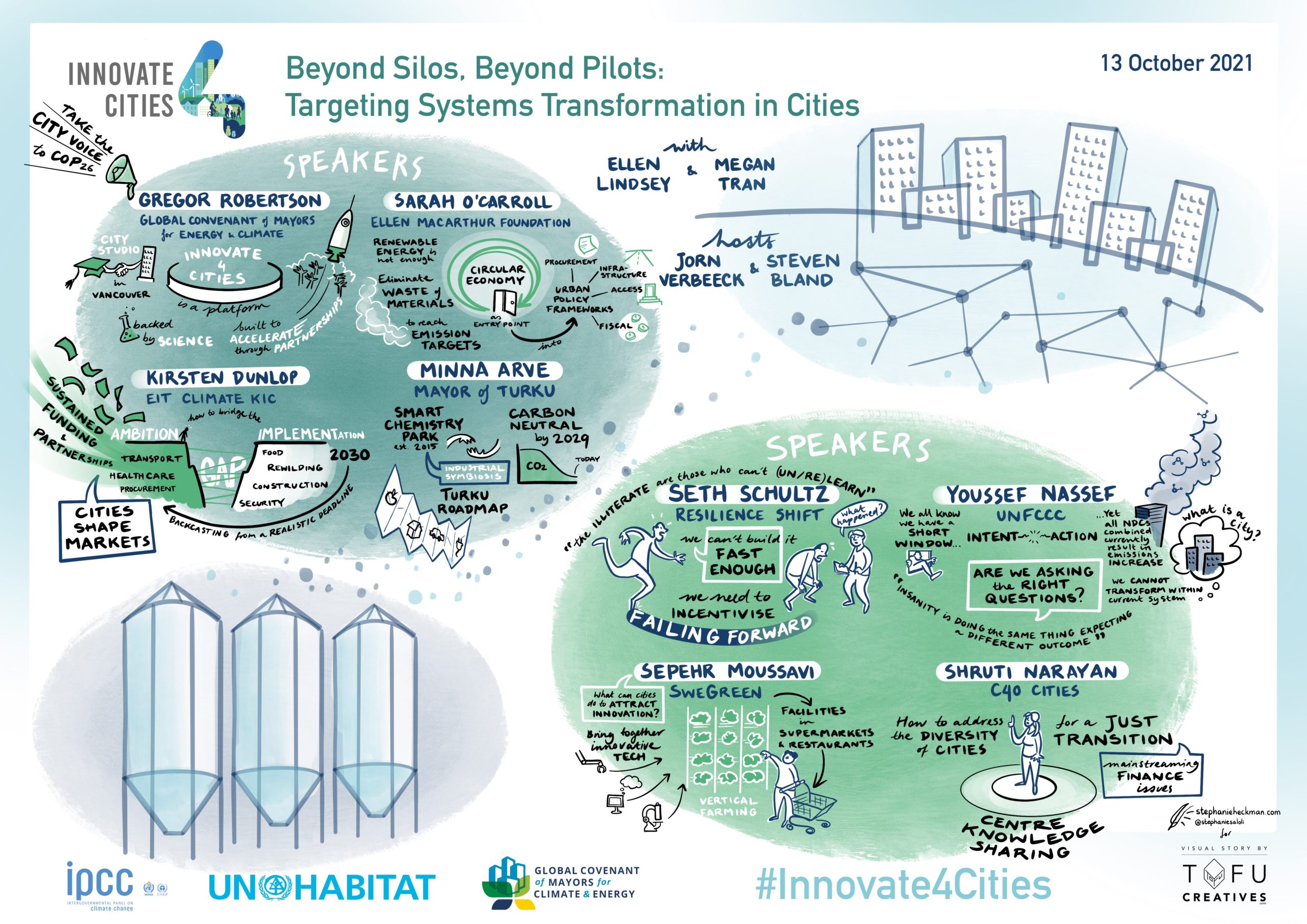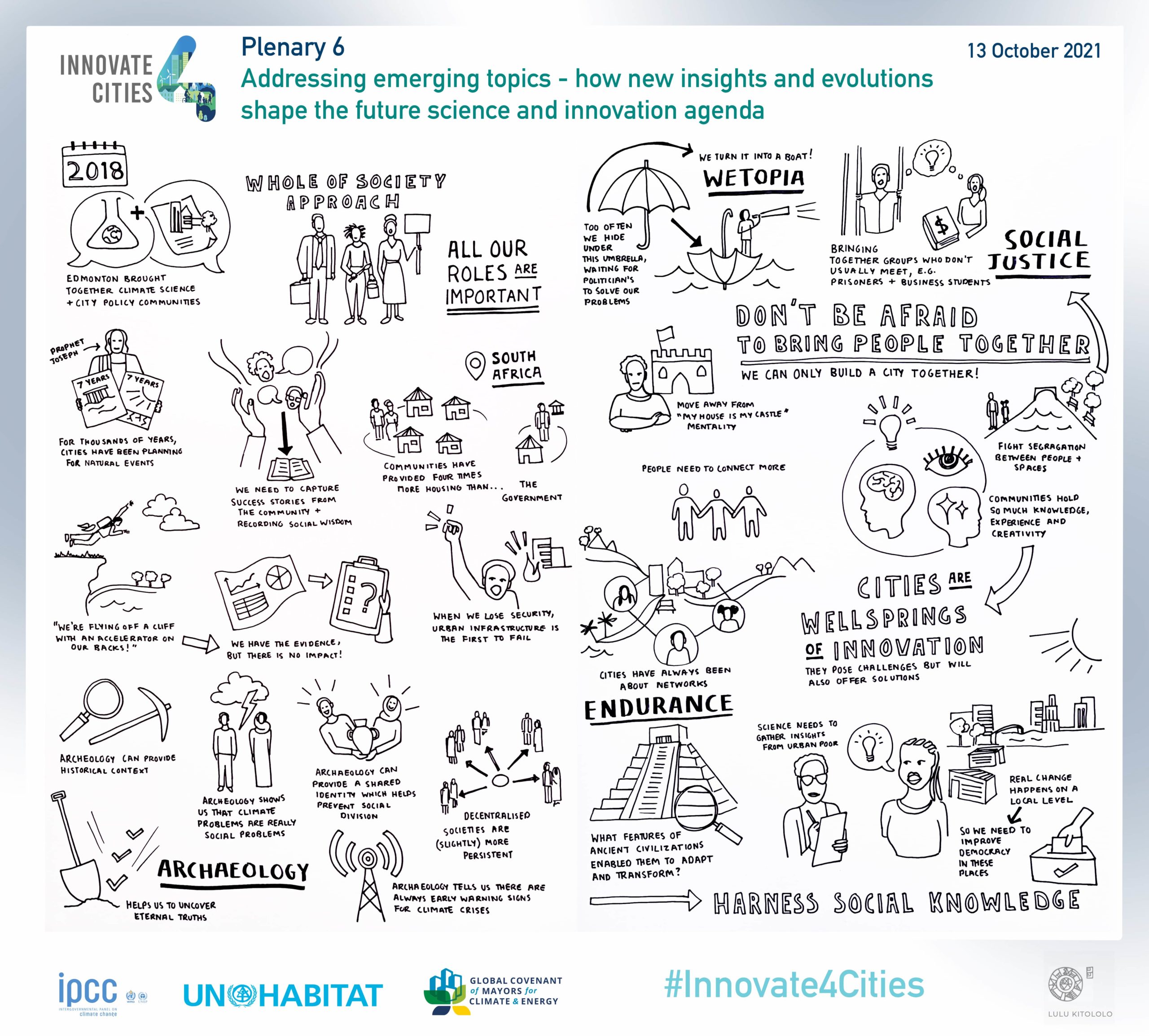Science and Innovation partnerships driving inclusive, resilient, and climate-neutral cities.
6901
registered participants
200
sessions
20,000+
platform visits globally
159
countries represented
About the 2021 Conference Edition
Building on the 2018 Edmonton Cities and Climate Change Science Conference and the resulting Global Research and Action Agenda (GRAA) on Cities and Climate Change Science, the Innovate4Cities 2021 Conference (I4C 2021) focused on the nexus of science, practice, and innovation – including local challenges, priority needs, and cross-sector opportunities to realize ambitious climate action. Against the backdrop of a green recovery from COVID-19, I4C 2021 raised local and regional voices – localizing efforts to build back better towards a cleaner, more resilient, sustainable society and a fairer world. The Innovate4Cities 2021 Conference was co-hosted by the Global Covenant of Mayors for Climate & Energy (GCoM) and UN-Habitat, and co-sponsored by the Intergovernmental Panel on Climate Change (IPCC).
Strategically positioned to take insights from – and subsequently inform – engagements including Race to Zero, Race to Resilience, the High-level Political Forum on Sustainable Development (HLPF), the Convention on Biological Diversity, and COP 26, I4C 2021 brought a constructive city and local government lens to the challenges, solutions, and pathways forward – inclusive of the regional sensitivities critical to fair and inclusive climate action.
I4C 2021 honed in on the themes of the GRAA, with discussions catalyzed by current topics including COVID-19 green recovery, climate justice, and building back better. Find out more about the conference themes See below:
2021 Conference Themes
I4C 2021 was built around the core themes of the GRAA, first developed in Edmonton in 2018. The onset of significant systemic challenges since Edmonton – including the COVID-19 pandemic, widening inequality, and sociopolitical unrest – has placed cities and local governments under ever-increasing pressure to make climate-safe decisions that strengthen community health, prosperity, and equity. To adequately address these challenges, I4C 2021 saw the addition of Justice & Equity, Health & Wellbeing, and Digitalisation/Smart Cities as cross-cutting themes to inform discussions and feed into future updates of the GRAA.
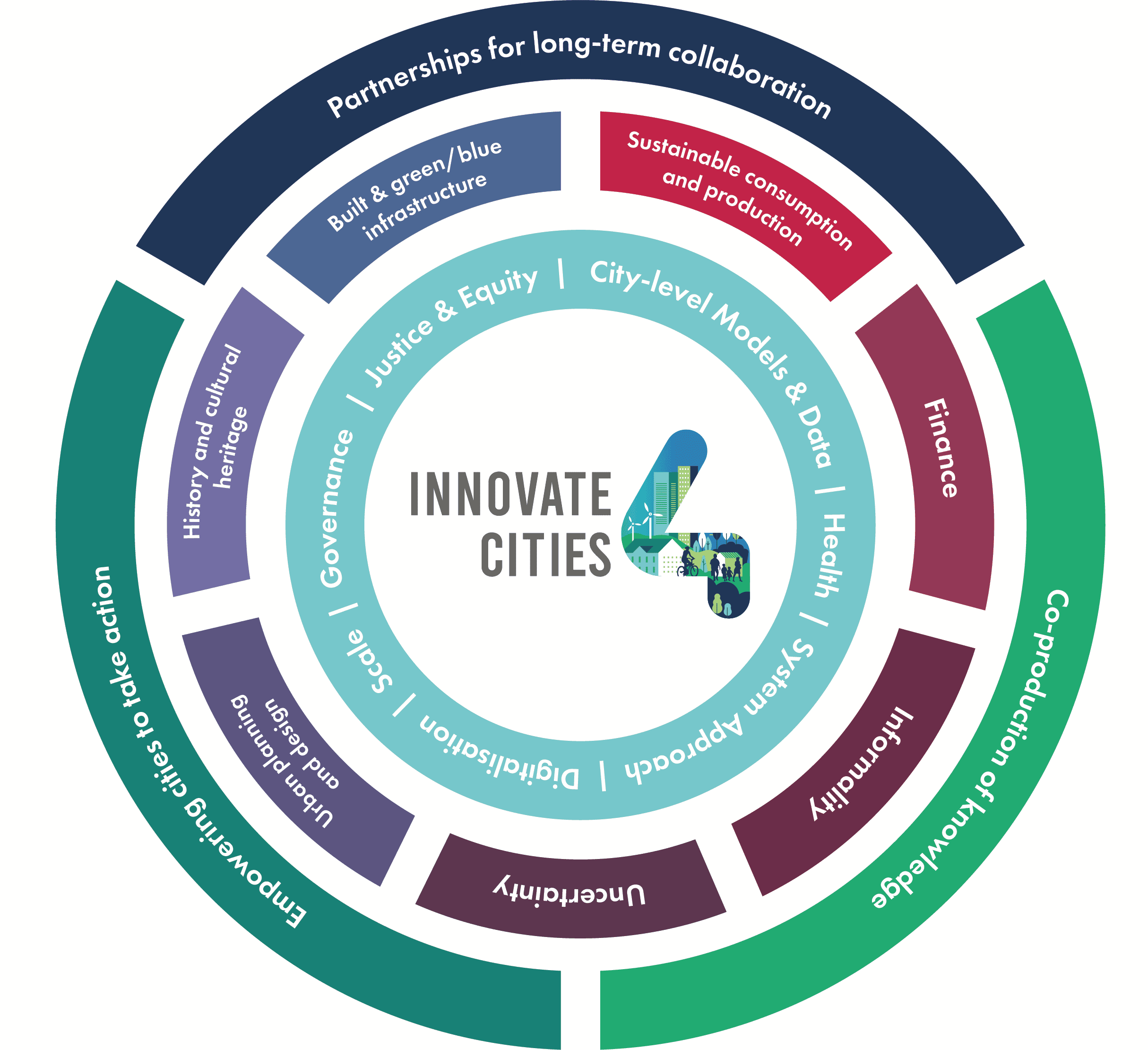
The inner circle shows key cross-cutting themes; the middle circle shows the 6 key topic areas, the external circle shows three suggested approaches that help facilitate implementation of our collective efforts. Adapted from the 2018 Global Research and Action Agenda graphic originally designed by Amanali Cornejo V.
Topical themes:
Infrastructure is essential for providing critical urban services and building resilience against climate change. However, it is paramount that growth in infrastructure, particularly in the global South, does not result in a carbon lock-in as this will ultimately hinder cities’ ability to mitigate emissions. Innovation in low-carbon infrastructure options and nature-based solutions are thus central to the sustainable development agenda, particularly given the range of co-benefits provided in relation to health, well-being, biodiversity, and enhanced urban amenity.
Topic ideas: low-carbon construction techniques, affordable low-carbon building materials, carbon storage in infrastructure, clean transport, energy transitions, bioclimatic designed infrastructure, nature-based solutions, in addition to the Cross-cutting themes.
In terms of unsustainable resource consumption, cities are at the heart of the problem, consuming 75% of the world’s resources and producing 50% of global waste (Ellen MacArthur Foundation). However, cities as centres of economic, social and cultural exchange, are well-positioned to tackle these problems. Innovation is needed in this domain in order to accelerate cleaner production, improve the circularity of material flows and encourage the diffusion of low-carbon materially sufficient lifestyles.
Topic ideas: Circular metabolism, Waste management and closed loop food systems, Industrial symbiosis, Sustainable and resilient logistic systems, Sharing economy, Sustainable lifestyle, in addition to the Cross-cutting themes.
A huge funding gap remains at the urban level, preventing ambition from becoming reality. Innovation in financing opportunities and mechanisms is urgently needed in order to address this problem. Innovative strategies for accessing, leveraging and scaling-up public, private and international climate finance are needed. Furthermore, innovation in sources of municipal revenue and research into insurance options and their role in addressing climate disaster risks are of significant utility.
Topic ideas: Support greater generation of municipal revenue for climate action, Carbon pricing, Green public procurement, Environmental cost-accounting, Participatory processes in securing finance, RRole of insurance in climate adaptation, in addition to the Cross-cutting themes.
A third of the current urban population is estimated to live in slums or informal settlements. The effects of climate change are driving further urbanisation in the global South and with this the population of informal settlements is set to increase significantly. Moreover, climate change will hit the inhabitants of informal settlements most severely, exacerbating existing inequalities. Innovation in this space is thus urgently needed to allow informal settlements to build resilience whilst at the same time mitigating carbon emissions.
Topic ideas: Urban planning strategies for vulnerable communities and informal settlements. Climate relevant investment for informal settlements, Informal communities’ contribution towards sustainable development, in addition to the Cross-cutting themes.
Many uncertainties still exist at the city level in regard to projected future climate conditions, levels of risk and vulnerability and the effectiveness of adaptation and mitigation efforts. Moreover, city-scale data is often under-represented and lacks integration across climate, biophysical and socio-economic datasets, particularly in the global south. Innovation and research into city-level data and modelling, along with better tools for risk assessment and risk management will help practitioners better factor these uncertainties into their decision-making.
Topic ideas: Better generation of city-scale data, better climate-relevant data on vulnerable communities, in addition to the Cross-cutting themes.
Multidimensional urban planning integrates mitigation and adaptation strategies across a range of different sectors, including energy, building and construction, transport, blue and green infrastructure and economic development. Innovations in spatial planning, energy, mobility and land-use will have strongimplications on GHG emission reductions within cities and can also provide many co-benefits in terms of better quality of life, improved economic opportunities and better health outcomes.
Topic ideas: Energy, mobility and transport infrastructure, buildings and Systems approachn space and habitats, in addition to the Cross-cutting themes.
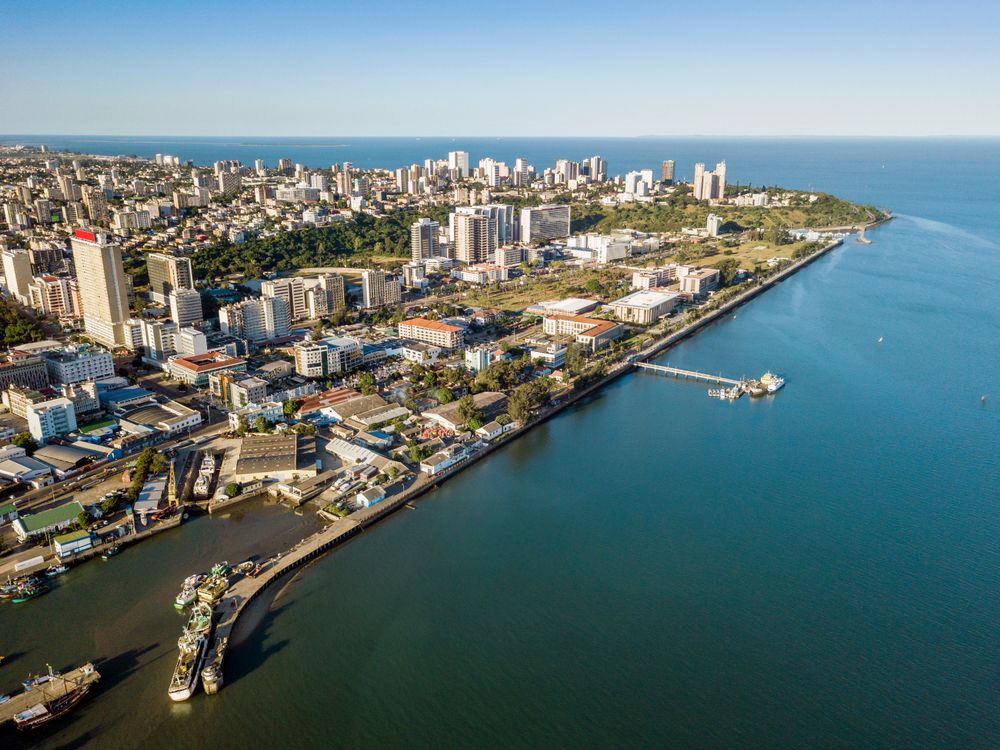

Cross-cutting themes:
Holistic approaches are needed to capture and integrate diverse forms of knowledge and data from a wide range of disciplines and perspectives. Cities must also be viewed as parts of wider systems, re-integrating cities within their regions is particularly important when considering material and biological flows.
When we rebuild cities in the aftermath of Covid-19 we must ensure that the green recovery delivers socially just and equitable outcomes. Adaptation and mitigation strategies must be developed under participatory and inclusive structures, and deliver co-benefits such as improving health outcomes, promoting economic development, delivering jobs and addressing gender and racial inequities.
Greater understanding of the impacts of climate change on health and wellbeing is required, along with innovation to scale up the co-benefits from city adaptation and mitigation strategies (i.e. nature based solutions, air quality improvements).
Innovation in digital technologies offers many opportunities for accelerating climate action in cities through improved operational efficiency, real-time data and analytics to aid decision-making and the creation of synergies between systems.
New knowledge is needed to increase our understanding of the interplay between policies and actions taken at different scales(local/national/regional), and how this affects the ability to take effective and coordinated climate action.
Key climate and socio-economic data are needed at the city level, along with improved climate modelling capabilities. Issues surrounding data privacy and access also need to be addressed.
Key climate and socio-economic data are needed at the city level, along with improved climate modelling capabilities. Issues surrounding data privacy and access also need to be addressed.
Regional Curators
From across the globe, our regional curator teams, comprised of local governments, research institutions and innovation partners, are supporting the delivery of a conference programme that is diverse, accessible and representative of regional priorities and interests.
Curatorial teams working and researching in the space between science and practice will bring valuable regional voices and perspectives to the table, share learnings and opportunities and highlight priority innovation pathways and partnerships, all in service of the ambitious delivery of climate goals.
The Innovate4Cities Conference Regional Curatorial teams, are recognised as supporters of the event, for providing curated programme segments that feature tangible on-the-ground outcomes, co-creation of regional solutions, and present leading research, innovation and practice from their nominated region.
Governance
I4C conference sessions and the conference outcomes were “knowledge-generating”. The use of innovative techniques for designing the conference sessions with the objectives to capture the nature of knowledge generated as a result of exchanges and presentations between practitioners and scientists shall be the key focus of the I4C conference. Providing critical input to COP 26, and the Special Report on Climate Change and Cities in the IPCC AR7 cycle.
The Innovate4Cities Conference was managed by an Executive Management and Decision Group, the Organizing Committee, a Science and Innovation Steering Committee, and a Partners Network Organizing Committee.
